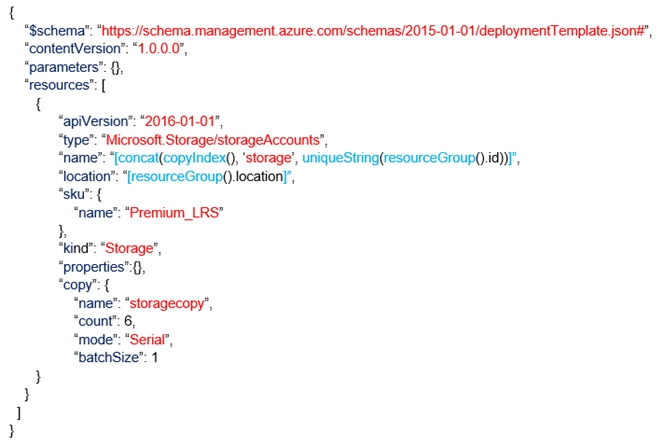Microsoft AZ-120 - Planning and Administering Microsoft Azure for SAP Workloads
You have the following Azure Resource Manager template.

For each of the following statements, select Yes if the statement is true. Otherwise, select No.
NOTE: Each correct selection is worth one point.

You have an on-premises SAP NetWeaver-based ABAP deployment hosted on servers that run Windows Server or Linux.
You plan to migrate the deployment to Azure.
What will invalidate the existing NetWeaver ABAP licenses for each operating system once the servers are migrated to Azure? To answer, drag the appropriate actions to the correct operating systems. Each action may be used once, more than once, or not at all. You may need to drag the split bar between panes or scroll to view content
NOTE: Each correct selection is worth one point.

You have an on- premises SAP environment hosted on VMware VSphere that in Microsoft SQL Server as the database platform. You plan to migrate the environment to Azure. The database platform will remain the same. You need gather information to size the target Azure Environment for the migration. What should you use?
What should you use?
You have a SUSE Linux Enterprise Server (SLES) duster that runs SAP HANA.
You plan to use Azure Monitor for SAP Solutions to collect STONITH block device (SBD) metrics from the cluster.
Which provider should you use. and what should you install on each cluster node? To answer, select the appropriate options in the answer area.
NOTE: Each correct selection is worth one point.

You have an SAP environment on Azure that uses multiple subscriptions.
To meet GDPR requirements, you need to ensure that virtual machines are deployed only to the West Europe
and North Europe Azure regions.
Which Azure components should you use?
You plan to deploy an SAP production landscape on Azure.
You need to estimate how many SAP operations will be processed by the landscape per hour. The solution must minimize administrative effort.
What should you use?
You are deploying SAP on Azure. The database server will use SAP HANA. The application servers will run Windows Server. You need to test network latency and throughput between the frontend SAP servers and the database servers. Which three tools can you use to achieve the goal? Each correct answer presents a complete solution.
NOTE: Each correct selection is worth one point.
You have an on-premises third-party enterprise resource planning (ERP) system that uses Microsoft SQL Server 2016. You plan to migrate the ERP system to SAP Business Suite on SAP HANA on Azure virtual machines. You need to identify the appropriate sizing for Business Suite on HANA. What should you use?
You have an SAP production landscape in Azure that contains an SAP HANA database.
You need to configure a Recovery Services vault that will be used to back up the HANA database server. The solution must ensure that the virtual machine and the HANA database can be restored manually to a paired region.
What should you do first?
You plan to implement a deployment of SAP NetWeaver on Azure. The deployment will be hosted on virtual machines that run a custom Windows Server 2022 Datacenter image.
You need to configure the virtual machines to support Secure Boot.
What should you do? To answer, select the appropriate options in the answer area.
NOTE: Each correct selection is worth one point.








